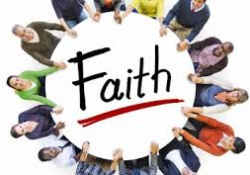Homily–Social Justice and the Crisis of Covid-19
Posted by Rev Roger
Posted on April 27, 2020
Online Worship, Sunday, April 26
Rev. Dr. Roger Jones
“We come together to deepen our lives and be a force for healing in the world.” – UUSS Mission Statement
Hymns: “We Are Gathered,” text by Amanda Udis-Kessler for this pandemic; tune “Nettleton” (see #126 in Singing the Living Tradition); “Spirit of Life/Fuente de Amor” by Carolyn McDade (Spanish by Ervin Barrios); “Come and Go with Me (to that Land.”
Special Music: Solo: “Common Thread” by Pat Humphries (Emma’s Revolution)
Homily
For my homily, I’m going to talk about the pandemic and social injustice. This crisis reveals and illuminates the inequities that already exist in our society, and it makes them worse.
In the weeks that we have been following public health orders to shelter at home, the disruptions and losses in everyone’s life have been stressful at best, and sometimes heartbreaking. Anxiety and fear are widespread. Some people say Covid-19 shows us that we are “all the same.” True, we are all human. We all feel frustration and worry; we all can get sick. Yet the damage of this crisis lands more heavily on those whose lives were already in danger.
` Friends of mine living in Seattle and New York City haven’t gone out of their apartments in six weeks. They are scared. Yet at least they are housed, and they are safe. They can have groceries delivered to their doors, as many of us do. Yet many families in the U.S don’t have the money to buy enough groceries. Even before Covid-19, food insecurity was widespread in this country. The pandemic both reveals the inequities of our society, and it makes them worse.
` In my own pandemic isolation, I grieve the loss of human affection and socializing. The loss of my routines and rhythms is hard on me. When I feel anxious and sad about this, I feel an urge to escape. I want to get away, get out of town, even get out of the country.
Yet where could I escape to? Every place in the world is living under quarantine. My usual privilege of being able to get out of town doesn’t count for much right now. And this makes me think of all the people who could not escape their situations even before this pandemic: Refugees were fleeing civil war and persecution, and seeking the mercy of a safe place and a new start. Now they face more dangers. Journalists and human rights activists were jailed by dictators and corrupt regimes. Now, autocratic rulers are using the pandemic emergency as a convenient excuse to suppress dissent and censor the media. Journalists and human rights activists want an escape from torture. Everywhere in this country, people have been living on the streets, year-round. Many people in their homes have been trapped with abusive partners. The pandemic makes it even harder to get free or find safety. Covid-19 is a time of danger and fear for us all, yet for so many people, that is not a new condition.
In October of 1939, shortly after England entered the Second World War, English writer C.S. Lewis was preaching a sermon called “Lessons in Wartime.” War, he said, is not an interruption of normal life, because life is never normal. In a war, in a pandemic, or at any other time, human life is always precarious. He said the human family lives always near the edge of a precipice. A cliff.
Some of us live closer to the edge of that cliff than others do—this is what it means to be marginalized—to be left out or kept out on the margins of society. Life is more precarious for some, more privileged for others. Social inequities and racial injustice are built into our systems.
For example, the U.S incarcerates a higher percentage of our people than any other industrial democracy. In our crowded prisons and jails, it’s impossible to keep a safe distance in an epidemic. In many prisons, neither inmates nor guards have enough protective masks. Yet even before the pandemic, our system of mass incarceration was immoral. That system hits people of color hard; it hurts them disproportionately. Without an aggressive legal defense, many of the accused plead guilty to get a shorter sentence instead of going to trial to defend against their charges. Moreover, many people are incarcerated for non-violent offenses. This includes mothers and fathers. Their children also are being punished—by emotional separation and economic loss.
Another example: Millions of people have lost their jobs, including many whom we know and love. This is a devasting blow. Those who can get a new job now are choosing a paycheck over sheltering safely at home. Yet for decades, low-wage employees have not had rights to paid sick leave at work. This meant they had to choose between working while sick or leaving a sick child at home and losing wages or getting fired.
In these trying times, we can be grateful for workers in food service and agriculture, whose jobs are deemed essential. Yet for generations these workers have endured unsafe conditions, often without health care. Now things are even more dangerous.
The federal government is paying emergency financial relief to many of us. Also, Congress recently granted a retroactive tax break which gave large refund payments to thousands of millionaires. But federal aid is not going to undocumented immigrants. Immigrants often work in construction, house cleaning, childcare, restaurants, landscaping and agriculture. Even before Covid-19, few undocumented workers had health coverage. Immigrant families were already afraid to call on the police or ask for government help or seek medical help. Now, if a loved one gets the virus, this fear may prove to be deadly.
Speaking up for the plight of people on the margins and remembering the people on the margins does not invalidate anybody else’s sense of loss, worry or frustration in this pandemic. These are trying times for us all, stressful at best and often heartbreaking. Yet we need to remember how many of our human kin were already facing loss, already surviving on the edge of a precipice, before this crisis began.
Some activists have said: we should not let this crisis go to waste. In other words, we should take advantage of the attention this crisis has generated and the energy it has mobilized. We should lift our voices to push government and corporate leaders to address the injustices which the pandemic has highlighted, and which it has made worse. We should not let this crisis go to waste.
Even in our anxiety and grief, many of us have the freedom and resources to speak out for change and work for change. We have the moral duty to listen to the people who have been surviving close to the edge of the precipice. We can listen, and we can follow their leadership into a new land of justice and a new land of freedom. We can honor our own sense of loss and frustration, and we can keep our hearts open. In the days to come, so may we strive to live. So may it be, blessed be, and amen.
Benediction
Our opening song this morning said:
We are gathered in commitment
to a planet that is whole.
Works of justice, acts of kindness
bless the world and heal our souls.
As our voices join together,
may our song of peace resound.
May we offer in abundance
all the grace that we have found.
So, in the days to come, may grace and peace abound
for you, for all of us, and for the whole human family.
May justice and freedom be our goal.
May courage and compassion be our guides. Amen.
Reading (referred to in homily)
In October of 1939, C.S. Lewis gave a sermon at a church in Oxford, England.
The sermon’s title was “Learning in War-Time.” He said:
I think it important to try to see the present calamity in a true perspective. The war creates no absolutely new situation: it simply aggravates the permanent human situation, so that we can no longer ignore it. Human life has always been lived on the edge of a precipice. Human culture has always had to exist under the shadow of something infinitely more important than itself….
We are mistaken when we compare war with ‘normal life.’ Life has never been normal. Even those periods which we think most tranquil … turn out, on closer inspection, to be full of cries, alarms, difficulties, and emergencies.




Sorry, the comment form is closed at this time.